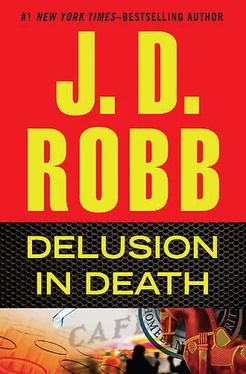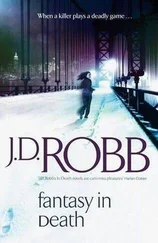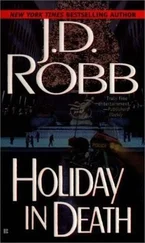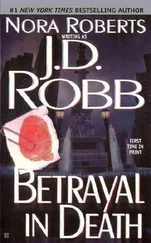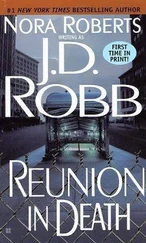J. Robb - Delusion in Death
Здесь есть возможность читать онлайн «J. Robb - Delusion in Death» весь текст электронной книги совершенно бесплатно (целиком полную версию без сокращений). В некоторых случаях можно слушать аудио, скачать через торрент в формате fb2 и присутствует краткое содержание. Год выпуска: 2012, ISBN: 2012, Издательство: Hachette Digital, Жанр: Триллер, на английском языке. Описание произведения, (предисловие) а так же отзывы посетителей доступны на портале библиотеки ЛибКат.
- Название:Delusion in Death
- Автор:
- Издательство:Hachette Digital
- Жанр:
- Год:2012
- ISBN:9780748125876
- Рейтинг книги:3 / 5. Голосов: 1
-
Избранное:Добавить в избранное
- Отзывы:
-
Ваша оценка:
- 60
- 1
- 2
- 3
- 4
- 5
Delusion in Death: краткое содержание, описание и аннотация
Предлагаем к чтению аннотацию, описание, краткое содержание или предисловие (зависит от того, что написал сам автор книги «Delusion in Death»). Если вы не нашли необходимую информацию о книге — напишите в комментариях, мы постараемся отыскать её.
Delusion in Death — читать онлайн бесплатно полную книгу (весь текст) целиком
Ниже представлен текст книги, разбитый по страницам. Система сохранения места последней прочитанной страницы, позволяет с удобством читать онлайн бесплатно книгу «Delusion in Death», без необходимости каждый раз заново искать на чём Вы остановились. Поставьте закладку, и сможете в любой момент перейти на страницу, на которой закончили чтение.
Интервал:
Закладка:
She sat back, hissed out a breath. “And it’s all a feel, a read. I don’t even have enough to pull the manpower to watch him.”
“Then we’ll have to find enough.”
“If I’m right, there’s going to be something, something buried in his background. His education, family history. And there has to be a trigger. He didn’t just wake up one morning and decide to kill a bunch of people. Something set him off, or gave him permission.”
“The campaign seems to have been their focus for the last several weeks. It’s interesting that the first attack came the night they’d completed it, and Vann left for the client presentation.”
“Maybe you know somebody who knows somebody who could arrange for me to talk to the client on the QT. Get impressions.”
“Why don’t you leave that to me? The client’s more likely to talk to me about business than to a cop about a murder suspect.”
“Okay, if you deal with that—”
“In the morning.”
Her brows drew together. “Why not now? I don’t want to waste time on this.”
“During business hours,” Roarke insisted. “If I approach this now, it’s going to make the client wonder. A contact during regular business hours—then it’s regular business.”
“I guess you’d know,” she grudgingly agreed.
“I guess I would. And it frees me to help otherwise. Abductees or background?”
She considered. “Go ahead with the background. Teasdale’s probably looking at abductees. Not the way I’m going to. But I can jump off her data.”
“Will you tell her what you’re doing?”
“After I do it, sure. It’s my case,” Eve reminded him when he smiled. “She’s consulting. She’s probably clean, especially after you microscoped her and think so. But I don’t know what she’s made of. She’ll get what I’ve got at tomorrow’s briefing, just like the rest of the team. Unless one of us strikes gold and we can move tonight.”
“Then I’ll get started being nosy. And since I fed you, you can deal with the dishes.”
“There’s always a catch.”
“The way of the world, darling.”
She couldn’t argue with that. Plus the spaghetti had hit just the right spot. She felt fueled and ready. All she needed was coffee to top it off.
By the time she’d finished, had a pot on her desk, she’d aligned her strategy. She’d start with the unrecovered.
Seventy-eight children who’d never been located—alive or dead. Most, she noted with a quick scan, had families, though there were war orphans and fosters scattered through. Easier prey, she decided. And without a parent searching for them, easier to indoctrinate.
She’d start with those, working her way from youngest to oldest.
The first, a female infant—three months—snatched in a raid of a makeshift orphanage in London. Mother dead, father unknown. She’d been one of eight children abducted. No DNA on file, but a small birthmark, like a blurry heart on the back of the left knee.
She called up the records, studied the search patterns, the statements from witnesses. Three women had died trying to protect the kids. Two survivors—male and female—had described the raid, the men and women who’d attacked the location.
The oldest, an eleven-year-old boy, managed to escape with two others. Smart kid, she thought as she read. His father had been a soldier, had taught him how to track, how to evade pursuit. He’d lead his two friends to a base camp, given the location where they’d been kept.
As a result, two more of the kids had been recovered—and the remains of another. Only the infant—who’d been named Amanda— and a two-year-old boy—Niles—were left. Whereabouts unknown.
She ordered the computer to perform an age-approximation image on both Amanda and Niles, studied the faces as the computer portrayed them today. Split-screened those images with those of the ID shots of Callaway’s mother and father, his paternal aunt, his uncle by marriage, even his grandparents, though that was stretching it.
No distinguishing marks listed on IDs for the women, she noted. But such things could be removed or covered up. Still she found no resemblance at all between the two lost children and any member of Callaway’s family.
She wondered if either child still lived, and if so where, how, with whom? Then she let it go. If she thought about each young innocent, she’d drown in depression.
So she moved on, inching her way through photos, descriptions, witness accounts, interviews with recovered kids, family members, interrogations of prisoners.
An ugly time, she thought, and as with any ugly time the innocents suffered and paid more than those who incited the ugliness.
More than lives lost, but lives fractured, or damaged beyond all understanding.
By the time she’d worked her way through half the list of lost children, she had a solid handle on how Red Horse had worked. Their leadership, their individual missions, credos, disciplines, even communications may have been loose, but their methods ran along a common line.
Use females to infiltrate camps, hospitals, child centers, gather intel on routines, security, numbers, then raid. Often, very often, she noted, sacrificing the female or female infiltrators in the process.
Take the kids, kill the rest—or as many as possible. Secure the kids, transport—scatter.
If kids died during the operations, well, there were always more kids.
She took a much needed break and carried her coffee to the door of Roarke’s office.
“I’ve got considerable,” he told her without looking up, “and some fairly interesting. I’m not quite done.”
“No, I just needed to step away from it a minute. It’s harsh.”
Now he stopped, looked at her. He’d seen her stand over the dead countless times, mutilated bodies, and take the blood and gore with her. So this was more.
“Tell me.”
She did, because it helped.
“After they scattered, regrouped, they’d begin indoctrinations on the kids who survived the raid. The younger ones, under four, they’d draw in with reward. Candy, sweets, toys. The older ones, or the stubborn ones, they broke down with pain or deprivation. No food, no light, whippings. A few escaped—very few. Some died, not so few. I’ve been reading old interviews with recovered kids that detail abuse—physical, emotional, psychological, sexual, off-balanced by care and comfort, then back to abuse if the kid didn’t renounce his family or swear allegiance to Red Horse—learn the doctrines, toe the line.”
“They tortured children.”
“All in the name of some vengeful God they’d decided to worship.”
“God has nothing to do with it. Man created torture.”
“Yeah, we’re good with inventing ways to screw each other up. If the kid had family, they threatened to kill his mother or father if he didn’t cooperate. Or they’d say his family was already dead. Or tell him, again and again, his family didn’t care about him, no one was coming for him.”
“Methods used throughout history to demoralize and break POWs, and to turn them when possible into assets.”
“It’s worse than what happened to me.”
She wanted to pace, to steam off the angry energy. Because she needed all the energy she could get, from whatever source, she continued to stand, rocking on her heels.
“These kids lost families who loved them, or were taken from them, then systematically tortured and brainwashed. The older ones, the stronger ones were used as labor—and if a girl was old enough, they forced her to have sex with one of the boys. They had freaking ceremonies, Roarke, and watched. Like a celebration.”
“Sit down, Eve.”
“No, I’m okay. Working through being pissed. It’s harder to work clean pissed off. I’ve got records of over thirty live births through abducted kids. The youngest on record was twelve. Twelve, for God’s sake. They took the babies from the girls. Impregnated them again when possible. I have one who was fifteen when recovered. She’d had three babies. She self-terminated six months after recovery. She’s not the only. Self-termination rates among the abductees is estimated at fifteen percent, before the age of eighteen.”
Читать дальшеИнтервал:
Закладка:
Похожие книги на «Delusion in Death»
Представляем Вашему вниманию похожие книги на «Delusion in Death» списком для выбора. Мы отобрали схожую по названию и смыслу литературу в надежде предоставить читателям больше вариантов отыскать новые, интересные, ещё непрочитанные произведения.
Обсуждение, отзывы о книге «Delusion in Death» и просто собственные мнения читателей. Оставьте ваши комментарии, напишите, что Вы думаете о произведении, его смысле или главных героях. Укажите что конкретно понравилось, а что нет, и почему Вы так считаете.
